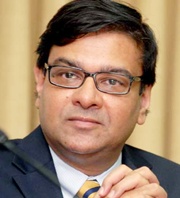Growth and economic stability are inalienable: Urjit Patel
12 Jan 2017
 Economic growth is directly connected with macroecomic stability and the country's future growth will depend on preserving and building upon what the economy has so far attained in terms of sound macroeconomic management, Reserve Bank governor Urjit Patel said.
Economic growth is directly connected with macroecomic stability and the country's future growth will depend on preserving and building upon what the economy has so far attained in terms of sound macroeconomic management, Reserve Bank governor Urjit Patel said.
Speaking at a function at the GIFT in Gandhinagr, Gujarat, Patel said it is important to remain vigilant to preserve and build upon what we have attained. ''Our credibility for sound macroeconomic management depends on it.''
This is especially so because of the two important transitions underway in the two largest economies. One is the realignment of fiscal, monetary and trade policies in the US, which has already imparted considerable financial volatility in the global economy in the last two months - even NAFTA is not sacrosanct, US trade partners, especially emerging markets, stand forewarned.
The other transition, of course, is the rebalancing of China's growth drivers from investment and exports to domestic consumption of goods and services. One of these transitions is welcome, the other not so, Patel said.
Against this background, the governor said, good policy housekeeping should be the cornerstone for the Indian economy – that the monetary policy framework backed by legislation is strictly followed.
The monetary policy committee is tasked with achieving a 4 per cent inflation target notified by the RBI and this should be the target while reviewing the monetary policy.
''We have to ensure that this objective is secured on a durable basis given the progress already made. In addition to monetary policy, the gain on reducing inflation has been, in no small part, due to supportive policies of the government, especially the proactive management of the food economy since 2014, he said.
"Low and stable inflation is an essential prerequisite for having a meaningful interest rate structure or regime whereby decisions by savers and investors help to achieve maximal allocative efficiency in an economy whose investment rate has to increase for better growth outcomes," he said.
"Concomitantly, we have to continue to press ahead for a more fluid, smooth transmission of monetary policy, as also enhance the formulaic linkage between changes in policy rates and other rates, including administered ones," he emphasised.
Patel said it is necessary to contain the fiscal deficit as the combined borrowing of the centre and the states in India are among the highest in the G-20 countries. This is also coming in the way of credit rating upgrade by international agency, he said.
Lower fiscal deficit will also help in better management of risk and curb financial volatility, which becomes more important in view of adverse external environment, he said.
The RBI governor also made a case for continuous support towards recapitalisation of public sector banks arguing that "a well capitalised domestic banking system enhances the comfort of the various stakeholders to conduct business in the offshore IFSC as well".
GIFT has been set up by the Gujarat government as India's first International Financial Services Centre (IFSC) that brings together world class infrastructure, connectivity, people and technology on a single platform for businesses across the world.
IFSC at GIFT City is probably the first such centre to be launched after the 2008 global financial crisis.
"In some ways, the light-touch regulatory philosophy epitomised by IFSCs came to be questioned in the aftermath of the crisis. However, GIFT City has the advantage of drawing the right lessons in this regard to avoid pitfalls," Patel said.
He also pointed that RBI has been working closely with all IFSC stakeholders on diverse subjects in the recent years to help GIFT develop.
"Today we see intense competition among the major IFSCs trying to position themselves for various business lines, and increase their business potential," he said.
In addition to the usual attributes there are two other dimensions, the broader economic environment in tandem with associated policies, and the micro ecosystem specific to the IFSC sector, he said.
On fiscal deficit, Patel said, borrowing even more and pre-empting resources from future generations by governments cannot be a short cut to long-lasting higher growth.
Instead, structural reforms and reorienting government expenditure towards public infrastructure are key for durable gains on the Indian growth front, he said.
"Investment in public transport, specifically railways and Urban MRTS can lead to reduced costs and productivity gains as also help us to lower our oil import bill, and, as collateral benefit, improve air quality in our cities," he said.
Patel said that while some government guarantees and limited subventions can help, steep interest rate subventions and large credit guarantees also impede optimal allocation of financial resources and increases moral hazard.
"The mandates for these have to be narrow, and thus perforce be deployed judiciously, within a regulatory framework, which RBI has suggested. Guarantees increase government's contingent liabilities, and add to risk premia for its own borrowing," he said, adding that guarantees per se at the end of the day have limited utility in solving important sector issues.


















